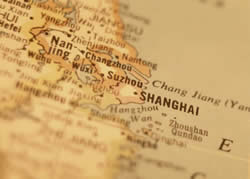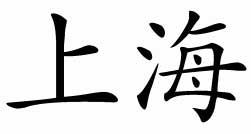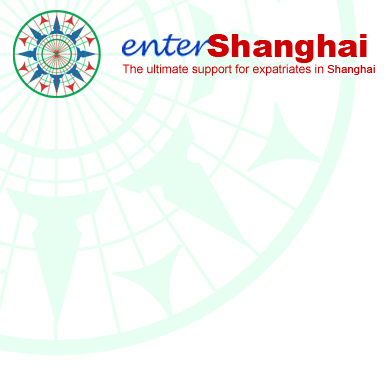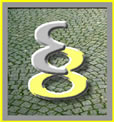
Shanghai - the City : Facts and Figures
Shanghai Municipality, in eastern China, encompasses 6,340 square kilometers, which includes the 748 square kilometer of Shanghai City, 8 surrounding districts and 30 islands in the Yangzi River.
The two Chinese characters in the name "Shanghai" literally mean "up/above" and "sea".

| Info | ||||||||
|
||||||||
| Info: Importing a car | ||||||||||||||||
|
The weather in Shanghai is extreme; cold, icy winters lasting from January until the end of April and superhot, humid summers running from the end of June to September. Most expats take a vacation to cooler climes for at least one of the hot summer months, usually scorching August. On the plus side, the weather in late September, October, November and early December is extremely kind, with temperatures in the mid-20s and no humidity. The spring months of May and June can also be lovely. If your friends and relatives wish to come and visit you, recommend October or June as the best times. Don't even think about letting them come in July or August where it is just too hot and humid to get around outside of air-conditioning.
| Website: | |
| Average temperatures: | http://weather.yahoo.com/ |
Shanghai is a massive city of approximately 16.74 million, including the floating population of migrant workers. However, it is a sprawling city so rarely feels overcrowded, unless, of course, you hit the main shopping streets on a Saturday or Sunday.
| Info | |||||
|
Shanghai's predominantly Han Chinese population is also predominantly Buddhist or Taoist, but China's most cosmopolitan city is also a great melting pot, with representatives from almost all ethnic minorities, and an active Muslim and Christian population. Temples, churches and mosques that were silenced during the Cultural Revolution have been revived, and make interesting places to visit. Traditional Chinese festivals, once outlawed as superstition, are also making a big comeback, but usually with a 21st century twist.
| Info: | |||||||||
|
|||||||||
| Publications: | ||||
|
See also e-relocation Shanghai Step by Step Guide Cultural Do's and Don'ts
| Info: | ||||||||
|
The language spoken on the streets, in offices and in the shops of Shanghai, is Shanghaianese (or Shanghaihua). It has a Japanese sound and, unlike Mandarin, it has no tones.
But, the language to learn is Mandarin, as this will connect you with all of China. If you were to learn just Shanghaianese you would not even be able to communicate with people in the nearby cities of Suzhou or Hangzhou, let alone Beijingers.
Everyone in Shanghai understands Mandarin and once you have perfected this, there are plenty of teachers able to move you on to Shanghaianese.
Although many Shanghai residents have a competent level of English, they are often too shy to use it. So, unless you intend on living entirely in an expat bubble, you should learn to speak some key phrases in Mandarin. When Chinese people see you making an effort (or, a fool of yourself), they will often find the courage to meet you halfway.
Many spouses of working partners tend to learn to speak Mandarin fluently through taking lessons and communicating daily with their ayis. This can be a great achievement and a key to opening many wonderful career opportunities.
taking lessons and communicating daily with their ayis. This can be a great achievement and a key to opening many wonderful career opportunities.
There are many language schools and teachers in Shanghai. The top schools tend to charge 70rmb an hour for small classes of 4 or 5, or you can opt for personal tuition which will cost about the same.
The universities offer intensive study programmes, often five mornings a week. But the homework load is heavy, so this may not be suitable for time-starved parents tasked with running a home as well. University classes tend to be large, with classes up to 35 students. This can be a distinct disadvantage when it comes to being given the opportunity to practice your all-important pronunciation in class.
All schools and teachers will offer you a free trial lesson before you enroll. This is a perfect way to find out who your teacher is, what the organization is like and who you might be studying with.
| Website: |
| Learning Chinese Online -01 Learning Chinese Online -02 Learning Chinese Online -03 |
| Learning Chinese Online Page |
| German Chinese |
Shanghai was established by the 11th century, becoming China's largest textile center during the Ming Dynasty (1368-1644) and a major trading port during the Qing Dynasty (1644-1911). The city came into world prominence only after being forced to open to foreign trade in 1842 after her defeat during the Opium Wars.
In a series of separate treaties, the British, Americans and French each carved out separate Concessions, with the British and the Americans consolidating to form the International Settlement in 1862. Shanghai became legendary for its glamour and its vice; it was Asia's largest, most cosmopolitan city.
The Communist Party of China was founded in Shanghai in 1921, but that didn't prevent Chiang-kai shek's Nationalist army from capturing Shanghai in 1927. The Japanese attacked the city during the 1930s, occupying the city for the duration of World War II. Shanghai was returned to China at the end of World War II, by which time Britain, the U.S. and France had renounced their claims to their Concession.
In May 1949, the Communists claimed the city; in October that year, they won national victory. During the Cultural Revolution, Shanghai was the base of the Gang of Four, but in 1990 when paramount leader Deng Xiao Ping declared that the city should open up and participate in the economic reforms, the city happily returned to her capitalist roots. Since then, Shanghai has grown into China's powerhouse, an unstoppable economic, social and cultural juggernaut.
| Website: | |
| Heritage Village for Arts & Culture | http://www.zhujiajiao.com/ |
China Jewish Heritage Tours |
http://www.joyfulnoise.net/ |
 The expatriate standard of living in Shanghai is high. But, while rents can be expensive, your food and utilities bills should be greatly reduced. Prices can vary, but generally speaking fruit, vegetables, meat and fish will be a fraction of the cost you are used to paying. The high cost of items like imported diapers and breakfast cereals can be a little bit hard to bear, the latter can be as much as 8 USD a packet.
The expatriate standard of living in Shanghai is high. But, while rents can be expensive, your food and utilities bills should be greatly reduced. Prices can vary, but generally speaking fruit, vegetables, meat and fish will be a fraction of the cost you are used to paying. The high cost of items like imported diapers and breakfast cereals can be a little bit hard to bear, the latter can be as much as 8 USD a packet.
House rentals and the majority of Western-style apartment rentals are focused on expatriates, as there is still quite a divergence between the living standards of the majority of the local population and the expatriate. Shanghai's growing middle class is beginning to invest in real estate, however, mostly private condominiums, and a recent easing of restrictions now allows expatriates to buy property. Many, have jumped at the opportunity to buy, seeing Shanghai as the next Hong Kong or New York.
For more information see Housing Market.
Buying a Car
Many expatriate packages include a car and driver, but for those that do not, public transport is inexpensive and efficient. The bus system may be daunting for those still unfamiliar with Chinese, but the subway, with names of destinations clearly indicated in Romanized letters, is easy to navigate. Most expatriates favor taxis, though, as these are extremely inexpensive and usually easily available. Although, as local incomes rise, and locals take more taxis, they are getting harder to come by. When taking taxis, non-Chinese speakers should make sure destinations are written out in Chinese characters.
See also Public Transport and car.
Education
Most expatriate employers include children's education in their packages, and this is an important consideration as international schools are extremely expensive here - and there is no local English-language alternative. Designated local Chinese schools are open to foreign students at a considerably lower cost.
See also Education
Energy cost
During the winter and summer months, heating and air conditioning can be quite expensive in Shanghai; energy cost for a three-bedroom villa with wall heating/air conditioning units averages RMB 1,500 per month. People in homes with individual heating/cooling units in each room often only turn on ones in rooms that they will be using to save energy cost. Some of the newer villas have central heating/cooling and even heated floors, but costs for these are higher. Be clear with your company and your landlord who is responsible for the energy bills, as it can be a significant expense.
Health Insurance
Many employers pay for medical insurance and costs; if this is not the case, it is crucial to get appropriate coverage, including an allowance for emergency evacuation. Shanghai's hospitals and foreign-managed clinics can cope with basic health-care issues, but more complex/serious issues are usually referred to more sophisticated health centers like Hong Kong or Shanghai.
See Health Insurance
| Publication:: | |
|
| Website: | |
| Asia Connect | http://www.asianconnect.com/ |
| International Salary Calculator | http://www2.homefair.com/ |
| Cost of Living comparisons | http://www.erieri.co.uk/index.cfm?FuseAction=LG.Main |
| http://www.info.gov.hk/hkecon/cost/doc/100.pdf | |
| Foreign per diem rates | http://www.state.gov/ |
| An updated table of Cost of Living (COL) | http://www.xpatulator.com/ |
| AmCham | http://www.amcham-shanghai.org/ |
| Info: | ||||||||||
|
China has a plug fetish! It must do, because you will find five or six variants within your household. They come in three, two-pin varieties and three three-pin. Because of this you will find yourself having to buy multiple extension leads with universal plug adaptors. These are inexpensive and available in all supermarkets.
During the peak summer months when the whole city is running air-conditioning in a bid to keep cool - you may well experience power cuts. However, you will most probably be forewarned as the government can forecast a shorfall in energy availability. The cuts tend to be short, lasting for no more than three or four hours each time. With this in mind, it is worth keeping a store of candles and a lighter in a place you can easily locate in the event of a powercut.
Certain wireless systems, like speakers, require licensing to operate in Shanghai, while others like baby monitors, do not. See above websites for more information.
Note: some of the web sites below load very slowly.









